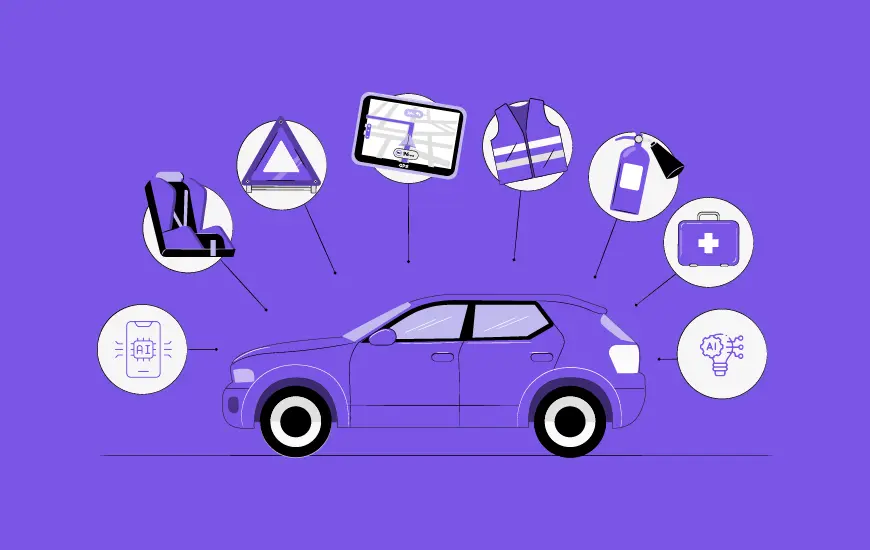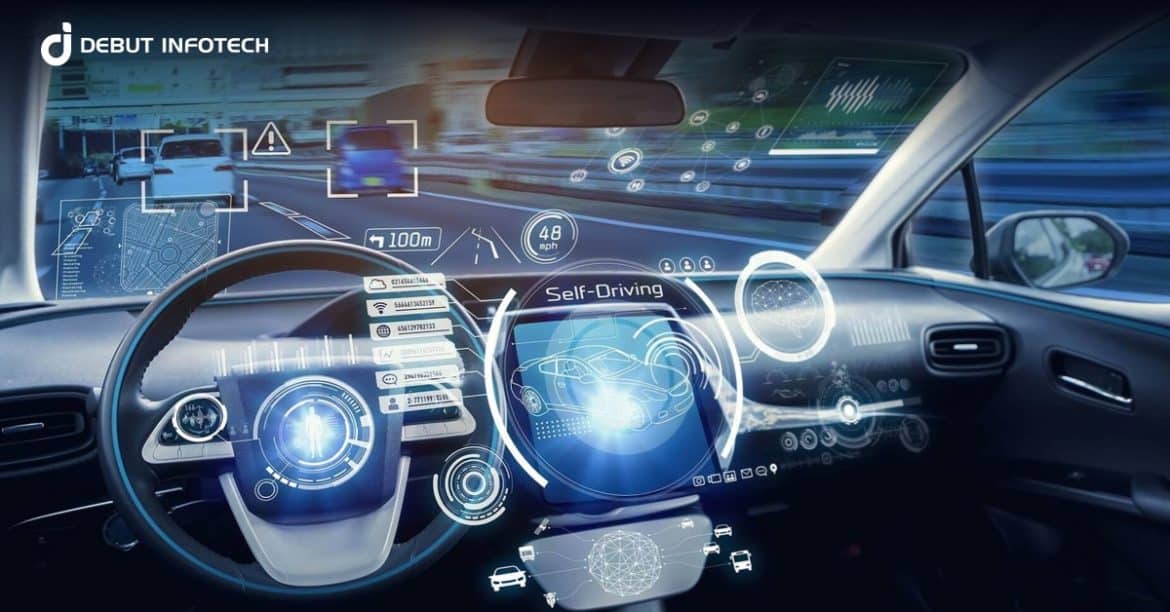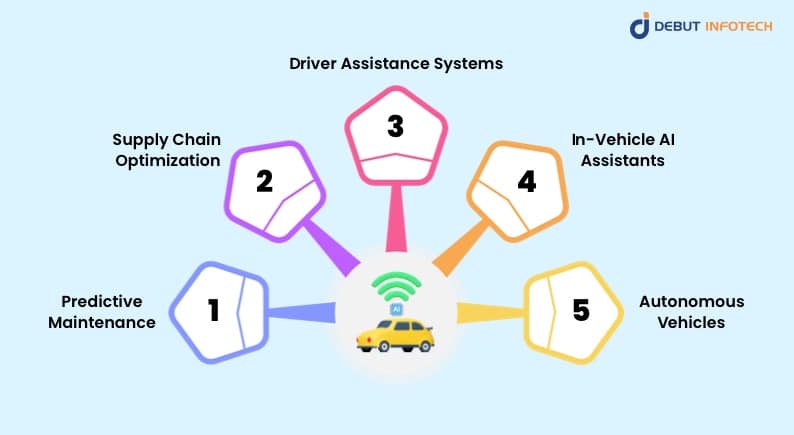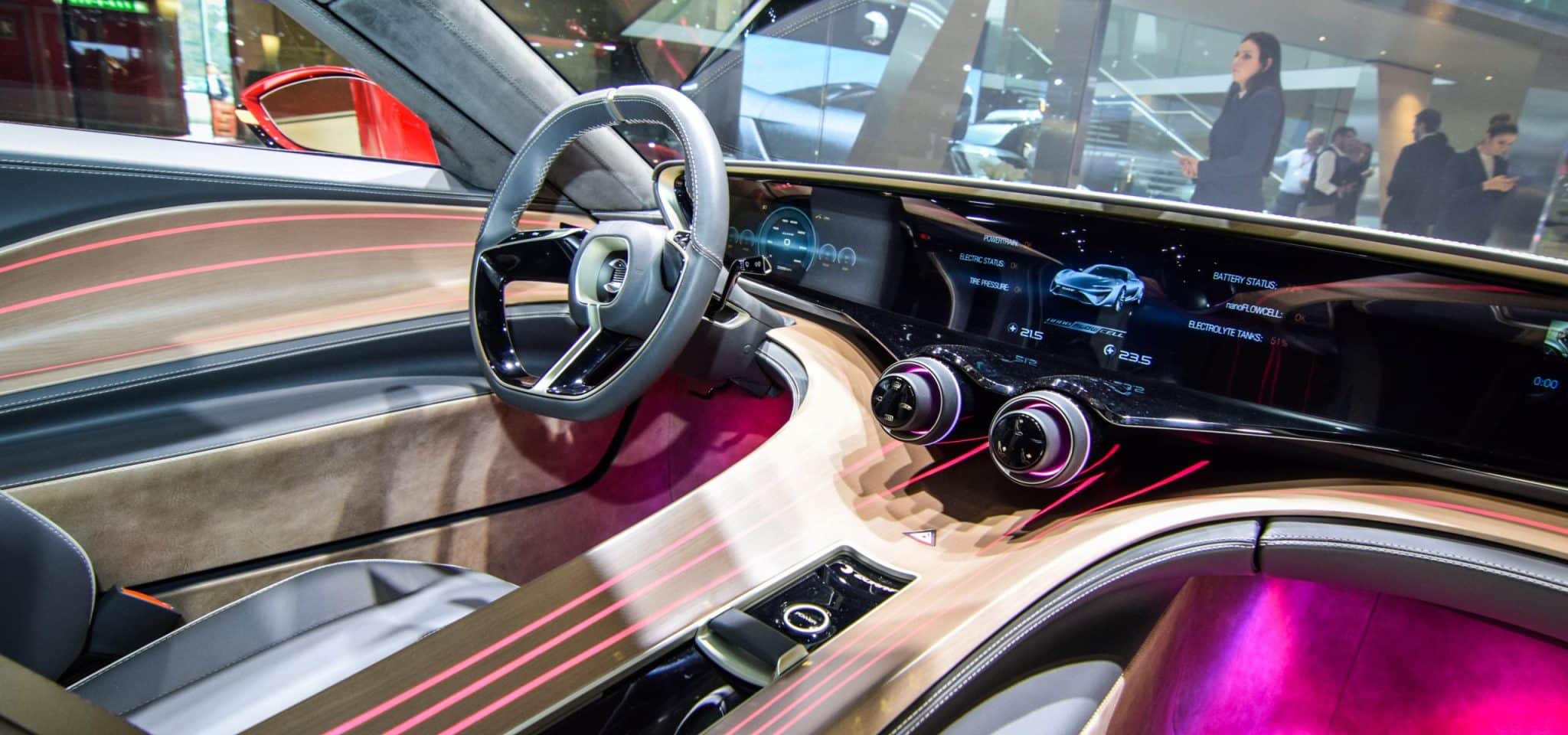The automotive industry is experiencing a transformation, thanks to Artificial Intelligence (AI). It plays a role in improving manufacturing methods and making autonomous driving possible, ultimately changing the way cars are created and used.
By 2025, artificial intelligence in the automotive industry will generate approximately $215 billion in new revenue streams. The demand for ai development services will likely increase. Also, the global automotive AI market size is projected to reach $744.39 billion by 2033, growing at a compound annual growth rate (CAGR) of 55% from 2023 to 2033. This shows the impact of AI in the automotive sector.
This article delves into the benefits of AI in the automotive industry, applications, real-life use cases, and the future of AI in the automotive industry, offering a comprehensive understanding of its transformative impact.
Benefits of AI in the Automotive Industry

AI’s integration into the automotive industry offers numerous advantages, driving efficiency, safety, and innovation. To leverage these advancements fully, hire AI developers who can provide cutting-edge solutions and future-ready technologies.
1. Enhanced Manufacturing Efficiency
AI-powered automation and robotics streamline production lines, reducing human error and increasing output. Predictive maintenance, driven by AI algorithms, ensures that machinery operates at optimal levels, minimizing downtime and lowering maintenance costs.
2. Improved Vehicle Safety
AI in the automobile industry contributes significantly to vehicle safety through advanced driver-assistance systems (ADAS). These systems utilize AI to monitor and analyze driving conditions, detect potential hazards, and take preventive actions, such as automatic braking, lane-keeping assistance, and collision avoidance.
3. Personalized User Experience
AI enables a more personalized driving experience by learning from drivers’ behaviors and preferences. Infotainment systems powered by AI can adapt to users’ habits, offering tailored recommendations for routes, music, and more, enhancing the overall driving experience.
4. Autonomous Driving Capabilities
One of the most significant benefits of AI in the automotive industry is the development of autonomous vehicles. AI algorithms process vast amounts of data from sensors and cameras, allowing vehicles to navigate, make decisions, and drive independently, promising a future with reduced traffic accidents and improved mobility.
Applications of AI in the Automotive Industry
The application of artificial intelligence in the automotive industry is diverse, spanning from manufacturing to customer service.
1. Predictive Maintenance
AI-driven predictive maintenance uses data from sensors and historical performance to predict potential failures in vehicles. This allows for timely repairs, reducing unexpected breakdowns and extending the lifespan of vehicles.
2. Supply Chain Optimization
AI enhances supply chain management by predicting demand, optimizing inventory levels, and improving logistics. This leads to cost savings and ensures that manufacturers can meet market demands efficiently.
3. Driver Assistance Systems
AI is at the core of modern driver assistance systems. These systems include features like adaptive cruise control, parking assistance, and traffic sign recognition, all of which improve safety and convenience for drivers.
4. In-Vehicle AI Assistants
AI-powered virtual assistants are becoming standard in modern vehicles. These assistants can manage navigation, control infotainment systems, and even monitor the vehicle’s health, offering a seamless and interactive user experience.
5. Autonomous Vehicles
The most prominent application of AI in the automotive industry is the development of autonomous vehicles. AI enables these vehicles to perceive their environment, make decisions, and drive without human intervention, marking a significant leap toward the future of transportation.
generative are crucial in implementing AI use cases in the automotive industry, such as predictive maintenance, autonomous driving, and advanced driver-assistance systems, enhancing safety and efficiency.
Real-Life Use Cases of AI in the Automotive Industry
Several leading automotive companies have already implemented AI in various aspects of their operations, showcasing its potential.
1. Tesla’s Autopilot System
Tesla’s Autopilot is a prime example of AI in action. The system uses AI to enable autonomous driving, including lane keeping, adaptive cruise control, and even autonomous parking. Tesla continues to refine this technology, bringing the industry closer to fully autonomous vehicles.
2. BMW’s AI-Powered Manufacturing
BMW uses AI in its manufacturing processes to improve efficiency and quality. AI-driven robots are employed in assembly lines, ensuring precision and reducing the likelihood of errors. Additionally, AI algorithms help in predictive maintenance, minimizing production delays.
3. Nissan’s ProPILOT Assist
Nissan’s ProPILOT Assist is an AI-powered system that offers semi-autonomous driving capabilities. It assists with steering, acceleration, and braking on highways, making driving safer and more comfortable.
4. Waymo’s Self-Driving Cars
Waymo, a subsidiary of Alphabet Inc., has developed self-driving cars that utilize AI to navigate complex urban environments. Waymo’s vehicles have successfully completed millions of miles in autonomous mode, demonstrating the feasibility of AI-driven transportation.
Future of AI in the Automotive Industry
The future of AI in the automotive industry holds immense promise, with advancements expected to drive further innovation and transformation. Companies offering generative AI development services will play a crucial role in the future of AI in the automotive sector.
1. Fully Autonomous Vehicles
The ultimate goal of AI in the automotive industry is the development of fully autonomous vehicles. While significant progress has been made, there are still challenges to overcome, such as regulatory approval, ethical considerations, and public acceptance. However, as AI technology continues to evolve, fully autonomous vehicles are expected to become a reality, potentially revolutionizing transportation.
2. AI-Driven Mobility Services
The rise of AI-powered mobility services, such as ride-sharing and on-demand transportation, is anticipated. These services will leverage AI to optimize routes, reduce wait times, and offer personalized experiences to users, reshaping urban transportation.
3. Integration with Smart Cities
As cities become smarter, AI will play a crucial role in integrating vehicles with urban infrastructure. AI will enable real-time communication between vehicles and city systems, leading to optimized traffic flow, reduced congestion, and enhanced safety.
4. Sustainability and AI
AI will contribute to the sustainability of the automotive industry by optimizing energy consumption, reducing emissions, and supporting the development of electric vehicles. AI-driven innovations will play a pivotal role in achieving the industry’s environmental goals.
5. AI in Vehicle Design
Future vehicle designs will increasingly rely on AI for innovation. AI will help in creating more efficient, safer, and user-friendly designs by analyzing vast amounts of data and simulating various scenarios.
Conclusion
AI is definitely changing the automotive industry, bringing a range of advantages, like improved manufacturing processes and the creation of self-driving cars. As AI technology progresses, its use in the industry will grow. This will spur innovation and influence the future of transportation.
The incorporation of AI offers an effective and tailored driving experience, setting the stage for a fresh chapter in the automotive sector. The future is full of opportunities, and AI will be leading the way in keeping us ahead in tech innovation.
Debut Infotech stands out as a top-notch AI development company, renowned for delivering state-of-the-art solutions customized to suit your business requirements. Our skilled team excels in leveraging AI to foster innovation and boost efficiency, and unlock fresh avenues for growth.
With a commitment to quality, dependability and client satisfaction, we support you at every stage of the AI integration journey to ensure seamless implementation and optimal outcomes. Count on Debut Infotech to equip your business with AI solutions that’re not just effective but also forward thinking. This will help set up your company for long term success in a competitive market.



